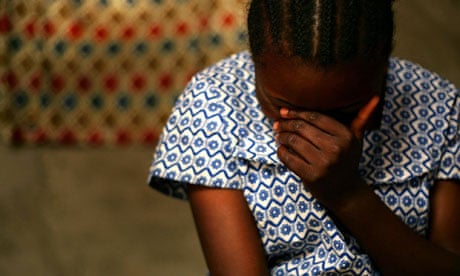Churches can "no longer remain silent on the issue of sexual violence", according to a Christian NGO, which said religious institutions were failing the communities they were meant to serve by not speaking out against the assault and rape of children.
Tearfund, a UK-based Christian relief and development agency, commissioned research on the current and potential role of the church to tackle sexual violence in Rwanda, Liberia and the Democratic Republic of the Congo (DRC). It said the results were a "shocking indictment of the widespread lack of a church-based response".
In Silent No More, a report launched at a conference on Monday at Lambeth Palace in London with the support of the archbishops of Canterbury, Burundi and DRC, Tearfund said: "The research showed there have been various responses from the church. In many cases the church has remained silent, where the church has spoken out, it has often led to increased stigma towards survivors.
"The silence of the churches on this issue is often the result of fear and their inability to envisage how to engage effectively. Churches have too often failed to realise their mandate to care and stand up for people on the margins. For this reason aid agencies, donors and governments too have failed to recognise the potential of the church to respond to this need."
One community leader in Rwanda told Tearfund: "The church is the only reliable social network within poor countries. People cannot go to the cinema or a club in order to find space where they can get away from their problems. The church is all they have. Also, many people no longer have family. The church becomes their only source of 'family'."
The report gave examples of how some churches were helping victims. The Anglican church of Congo has established an association offering practical support – helping women access preventative HIV treatment within 72 hours of an assault, raising awareness of rape laws, and assisting with social integration. But it was one of only a few instances of church-led activity.
Among those attending the launch were Lyn Lusi, from Heal Africa, which helped Tearfund with its research in DRC. She told conference delegates that church leaders needed to follow the example of the anti-slavery champion William Wilberforce.
She said: "It has taken 200 years for the change in relationships between blacks and whites to become reality. It has been a long road. The churches were key players, they knew what justice meant. The church is facing the same challenge – for justice between men and women."
One of the things church leaders could do was to read the whole Bible and "not just the verses that prop up their power base", she added. Lusi and other speakers claimed that some men used scripture to justify hurting or marginalising women.
Earlier this year, Anglican leaders wrote a letter acknowledging that churches were partly responsible for "perpetuating oppressive attitudes towards women" – there is divided opinion on the role of women in churches – and committed themselves to raising the profile of millennium development goal three: to promote gender equality and empower women.
